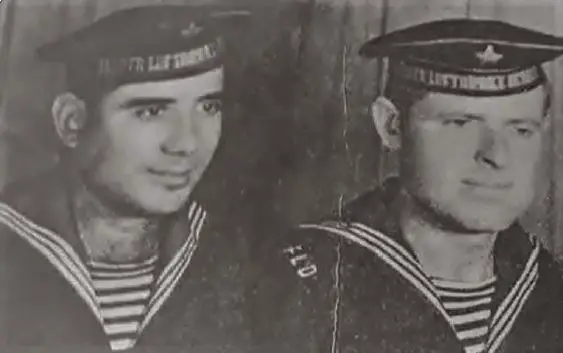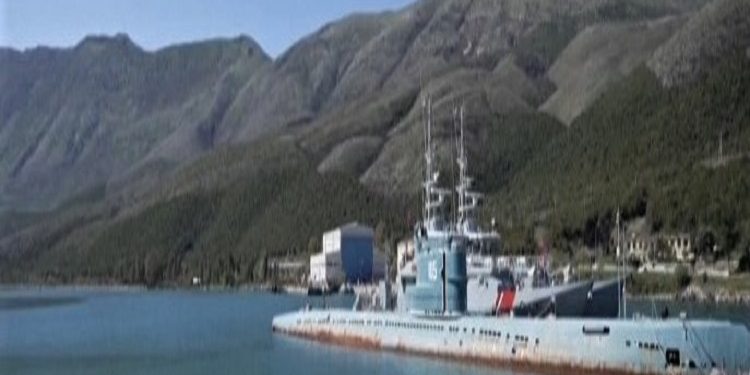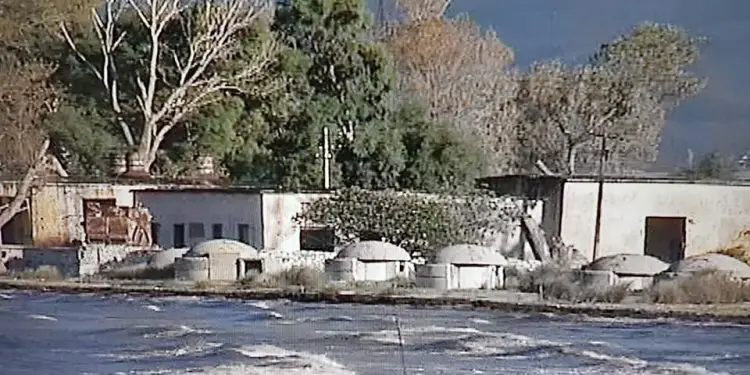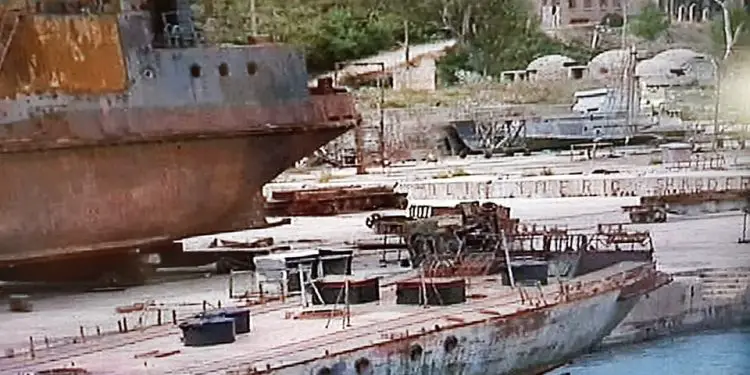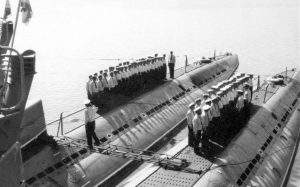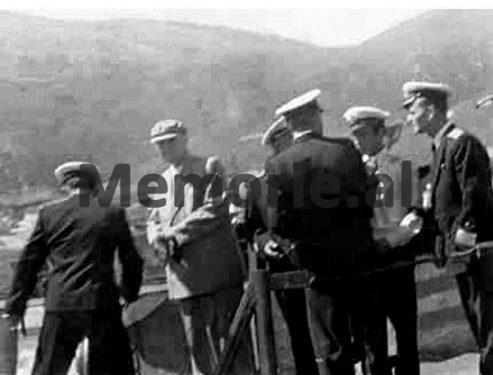By Gëzim Llojdia
Memorie.al / The soldier at the Orik Naval Base gave it to us by hand. – I mean; enter Pashaliman Naval Base. This reminds all local tourists and some foreigners of the scenes of the Albanian film: “Face to Face” that describes the great crack in the winter of 1961. As a novel, “The Great Winter” contained more historical and artistic value. Tourists had asked me where the scenes of that movie were. From the entrance gate to Orik, the road showed a lot. The entrance to ancient Orik, once had an iron port, painted brown. The school of instruction, the sports field and some railings in the outer harbor of Orik, in front of the buildings of the school of instruction, were some signs left from the shooting of the film.
To the left of the office, there are about 5 archaeological objects which were exposed from the findings made in 1958-’59 after the first excavations, by the Albanian-Soviet expedition, directed by Dhimosten Budina and Kabilina, when the first expedition started to dig in Orik, had turned upside down, fallen at the mercy of fate. One reason is because these objects were collected from military buildings. The soldiers had taken care that these objects were not lost and after having the soldiers paint them with white lime, they had placed them in front of the buildings for decoration. At that time, with a scrap bucket, we very carefully brought them in front of the building, to become part of the place from which they had left, exposing them in front of it.
Cars were parked there one after another, they came to visit Orik, the ancient city on the Adriatic, about which Caesar himself speaks. The port mentioned by Caesar is located in the lagoon 2.2 km. long and 1.2 km wide, which has the shape of a triangle with the base facing the sea. It is separated from it by a sandy strip, to the west of which history writes the hill of the city. In the extreme west, according to this chronicle, the quay is crossed by a canal, which connected the lagoon to the sea. Inside the lagoon, under the “water mirror”, traces of a 1.80 m wall can be seen. wide, which is connected to its two banks.
We are dealing with a wharf for mooring ships which, starting from the width of the lagoon in this place, reached about 200 m. length. Orik was built as a port, which means a connecting bridge, to and fro, between there and here. A town, a small port, at the foot of Akrokeraune, (the mountain range that starts in Karaburun, continues with Qorre peak, Pogonica, Shëndelliu peak 1404 m., Gjinika – Qeparo, Dobrat – Kudhes). It is mentioned with this designation, by the authors: (Hecat Fr 75 ap Steph B. sv;….. Herod IX 92;.. Scyl P. 10;. Polyb vii 19;. Scymn 440;.. BEST Ad Dion 321;. Oricon, Ptol iii 14 § 2;… Pliny III 262).
Since the naval base was established in Orik, the importance of this port was seen to be very strategic.
The break with the Russians, brought the events in the 60s, which describes the media of the world. About these events, the Albanian film “Face to Face” also spoke. The time when filming on celluloid was also done at the Pashaliman base, once called Orik, belonged to the late 70s (1979). Those who experienced the days of that winter of ’61 show how realistic a feature film dedicated to a historical event was.
However, the film was an artistic creation and knowing its time and propaganda, it must be said that the increased doses did not elevate the film to a higher level. Of course, it remained an artistic creation after all. Regarding this, Stefan Miho, a former non-commissioned officer who has served for years at that naval military base, once told us.
Mr. Miho, how was the situation at the Pashaliman naval base in the 1960s?
Vollodjan, whom we respected as a friend of the house, but also as an officer, one day came to work with a “Java” motorcycle, full of makeup. He came down and we were impressed by his haircut! He was tall with an athletic body, he played a lot of volleyball and basketball, he was blond, with a little hair, but a bald head. Russian officers were shaved high in the back and did not wear favors. Volodja had left his favors and he seemed to us that day a foreigner, arrogant and liberal, with a motorbike, unlike the other officers who came by bus from Orikum. He entered the cabinet and came out to meet Abedin. He was telling her something with his feet and hands. We could not understand anything. But Abedini, as the Albanian that he was, was known as fair and decisive, he did not back down. This time, I saw him as if he had finished his work and had nothing to say. After that, events flowed so quickly that people began to get disoriented.
So, what happened next?
That afternoon, the classroom assistants were ordered to remove the painted mural portrait of Hurshov from the corridor of the cabinets. Poor Khrushchev, with one drop of the beak, was torn to pieces and went to the trash! I felt sorry for the work done by the torpedo painter, the talented Jorgji Gjikopulli. The order was given from above. This was done secretly and without the presence of the officer, only with the assistance of the platoon commander, Selim Stepa.
The fragmented portrait of Nikita Khrushchev ended up in the cesspit! The next day, the protest was as big as it was funny, but also insidious, because the action was done at night in secret and without the Soviet sailors and personnel! However, they had no intention of engaging in our adventures, and it was good that even the possibility of an armed conflict was avoided. Apparently, they had orders from their superiors. The portrait was gone.
Volodja put pressure on Abedin, who had taken the job after the top leadership, after the arrest of Teme Sejko, had taken the measures and in addition to the blow, which he did to the “hostile group and the unmasking” between the “court” openly in front of everyone the effective of the Fleet, made the vertical and horizontal movements of the cadre, so that there was no shock in the Fleet. Everything would be done according to the management’s predictions and without incident. That day, Volodja was holding Abedin accountable for removing Khrushchev’s portrait from the cabinet, and Abedin replied that: In its place, the portrait of the great Stalin would be placed! After this explanation, Volodja went mad. He clenched his teeth and said: – “We have a goal to produce specialists for the Fleet, we don’t care much about what our parties do. We are soldiers and we have this duty”. -” Well done, Volodja! Away from the army from politics”, we told him!
One thing is certain: Khrushchev applied and pursued a policy different from his predecessors, both domestically and externally. Volodja was prepared, cultured and had graduated from two military academies. In response, Abedini says: “Kanjeshno tavarish Volodjat”. There was silence and everyone went to their positions.
Volodya went to conduct the morning meeting under the direction of Smirnov, the motorcyclist instructor, for whom I have the highest regard for his simplicity, his way of communicating with us and maintaining balance, as it seems to me that he was in full support of our party, I even think he could be a Stalinist. He not only maintained good attitudes with our officers and especially with the Albanian instructor, Jeton Baruti, who merged with Captain Smirnov and cooperated with him, in all aspects, but also that he did not allow incidents between the two ethnicities in the school.
Have there been other incidents?
One of the military measures taken after this was the beginning of an adventure. Every dinner, we assembled the 14.5 mm machine gun from the artillery class, took it in our arms and climbed to the top of the hill, close to the prison building. We assembled it and filled it with cassettes with cartridges and stood ready, in the war against the enemy, which we had in front of us, the Russian base of Katelinkov, where it consisted of the big base and eight submarines. This base itself carried heavy-caliber weaponry on its deck, where a shell from its cannons falling on the school would bring out black water. But here we were training, to face this: “Russian elephant”.
The dedication was great. In the morning, after we had spent the whole night dressed and sleepless, ready for war, we dismantled the machine gun, took it back to the classroom, assembled it, and when Volodja came, he found the teaching material base, ready for teaching. This continued for fifteen days and fifteen nights in a row, until the Soviets left the Pashaliman Base! This task was entrusted to us sailors and non-commissioned officers, some of whom were young artillerymen. It was a trial period for us, which was successfully passed. The Soviet cadres, forced by the measures taken by us and the orders of their superiors, became “lambs”. Near us were representatives of the Central Committee, of the Ministry of Defense, who repeatedly ordered: “Beware of provocations.”
What was the incident that created an uproar at the base?
I never remember that the Russians provoked us at school at that time, except for one occasion when the driver of the Soviet bus collided one day with a sailor who had come out early in the morning with a wheelbarrow full of garbage, and got in front of the driver, who eventually avoided the accident, got off the causeway and went to the seaside without a problem, but from our side it got big. With Volodja, we occasionally had free conversations as friends. He kept telling us about our instructor, who was married to a young girl. Our instructor was 15 years older than her, and Volodja said to me: “Stefan, what’s up with that woman?” She looks like his daughter”!
That’s how it was then, the navy officers took the most beautiful women, because the good girls said; or officer or engineer, but especially naval officers. were enviable. Unlike the School of Specialties, the Torpedo Office, built next to the Repair Mechanic, 100 m. far from the sea coast, it served for the preparation and supply of air and acoustic torpedoes for submarines. A special impression when I showed up for my new job was that there were two guards at the entrance of the office, of different nationalities and citizenships, one Soviet and the other Albanian.
Both, armed. They did not allow the sailors to enter without the permission of their superiors. The training was interrupted. The Soviet guard stood to the left of the door with a “Kalashnikov” on his chest, while the Albanian guard, on the right, with a “Carbine” near his leg, a weapon with a serious attitude, also on guard duty. The entire Albanian-Soviet naval force stood above the office, chatting freely. No one will believe it after seeing the movie, but the truth is somewhat different.
The film “Face to face” is based on Kadare’s novel about the events of the 60s based on Pashaliman, how realistic is the film?
I noticed that the politicization of the events of the time there was less than at school. They played and laughed, enjoyed themselves, not working. One side, from now on, would become the master of the war tools and the other was happy that he would leave Albania and return to his country. The language of communication between the sailors was at the necessary level, thanks to the good and friendly relations that existed between the two main superiors of the office, Captain Smirnov and the head of the office, Velo Azemi, who had finished school in the Soviet Union. In fact, there he married a local woman and had a son with her, but the Soviet government did not let him leave to take him with him to Albania, when the final separations were made.
Smirnov, several times assured Velo that nothing bad would come from him and he would not touch anything, both from the weaponry and from the relevant literature. As far as I know, when I went, I found everything I needed. Such as texts for the preliminary and final preparation of torpedoes, books on technological processes for their light and medium repairs, and up to the relevant literature for electronic devices.
The film “Face to face, in my opinion, is politicized, and there is no way not to be like that, because it served the time and the regime for the moment, to keep alive the combative opinion of sailors and cadres, but also more widely, because we had another enemy, besides the American and the Soviet one. In the film, it is said that sabotage was done, by stealing some acoustic torpedo igniters, which seems to me something meaningless, to call it sabotage, on their part in the Torpedo Office, because it was stored, guarded and controlled by the guards of the Albanian sailors.
However, for now let’s accept it as such and if it has been done, it could be done to a great extent. It was enough to take two or three crates and all the acoustic torpedoes would be out of order, whether these were KMD 1000 my detonators. If it was done, it could have been done by ordinary and inactive people, just to done badly by a friend, but somehow, the sabotage was coordinated by Captain Smirnov, or conspired by the Soviet state. Then at the head of a group of specialists, Skender Sulku went to China, to get detonators of acoustic torpedoes and KMD-1000 mines, torpedoes, which later I don’t know why they went out of armament. They were replaced by electric torpedoes.
The testimony of the former non-commissioned officer, Stefan Miho: “This is why the Albanian Prime Minister, Mehmet Shehu, came to Pashaliman”?
I didn’t leave the school, but I went there from time to time and met old and new friends who came there. Right after the 4th Congress of the Party, Enver Hoxha came out openly against Khrushchev and in March of 1961, the Prime Minister of the country, Mehmet Shehu, came to the Pashaliman Naval Base. At that time, the Soviet troops were preparing to leave. He came to break down the directives of the Party Congress, to teach a good lesson to the Soviets, to calm the blood, which had been inflamed between the two identities, Russian and Albanian, to give heart to our effective, that nothing it would not happen between us, and that the friendship would continue as before.
There would be divergence between the two parties, where our first party stood firmly in the sound positions of Marxism-Leninism, while the second party had slipped into revisionism. Nikita Khrushchev, had agreed with Tito, the head of international revisionism, had softened the position with the Americans, who at that time had forced him to withdraw from the Caribbean Sea the missiles destined for Cuba, and other Khrushchev’s misdeeds, which were called as an unacceptable softening by our party, in the international plan of the class war, and in the ideological plan, she called it a departure from Marxist-Leninist principles.
Now the head of this revisionism would no longer be Titua nor Yugoslavia, but the Soviet Union, i.e. a sixth of the world, the head and leadership of the Socialist Camp. The leadership of our party in the country, in order to agree, did the opposite. For principles, she sacrificed friendship with them, civil and military agreements, to the detriment of a suffering and small people like our country, just to not violate the principles.
But let’s go back to Mehmet Shehu, who came and entered the ward’s cinema-club hall, whose capacity exceeded seven hundred seats. He was filled to the brim with cadres and sailors, where he was given a magnificent reception. The Albanian operative had gone to the cinema-club earlier and had taken a seat, from the beginning to the end of the hall, leaving several empty seats in the rows, for the Soviet military operative of the Submarine Brigade. Unlike other times, where the front rows were reserved and left empty for the big brothers, Soviet officers and sailors, this had not happened on this occasion.
The Soviets came organized to participate in this meeting, but occupied the empty seats between the rows, together with the Albanian sailors and cadres. This waiting was unusual for them, but they were forced to sit among the Albanians because, after all, we were friends! When Mehmet Shehu entered and went up to the stand with an almost military appearance, everyone rose to their feet and burst into cheers for the party and Comrade Enver. The ovations were not over. Whether they wanted it or not, the Soviets, forced by the elbows of the Albanian sailors, stood up and applauded together with us.
Mehmet Shehu’s appearance in the hall evoked the nostalgia of Stalin’s figure, so much so that a Russian sailor was heard from the crowd to shout: “Oc blot kak Stalina, and tears flowed from his eyes.” He was Georgian and his love for Stalin was great. Mehmeti then electrified the hall with his famous speech, where, among other things, he emphasized: “Who has lived in a bed with Tito, the next day he is pregnant with revisionism!” Who has eaten in a bowl with him, he has been fed with his revisionism! – the translator struggled, but Mehmeti himself took the word in Russian:
“Translate well”! Later, he continued: “Our party has neither lived nor eaten in a bowl with Tito, but it has stood and will stand firmly in the trench of Marxism-Leninism.”
The echo of that speech gave the operatives heart and optimism that nothing was going to happen in the future, on the contrary, Albania with the final separation with the Soviet Union would be saved from a black panther of the Slavic-communist world. She intended to make the Pashaliman Naval Base her property.
In May, there was the flag incident, which caused a great stir, where a Soviet sailor raised his flag at the Naval Base, while our sailor, who saw it, cut off his flag and the fight was resolved, both rising the flags together, next to each other. There were no more disputes between the troops. The talks were held between experts from both countries, where there were also clashes and of course, many things were said that we do not know.
It was not easy for the Russians to face us because above their heads, in Karaburun, the hills of Orikum, Sazan and the coast of Vlora, stood the coastal artillery, ready for anything, that’s why they accepted the withdrawal from the base without conditions. The departure of the Soviets from Pashaliman that winter, dressed and frustrated with the artistic stuff, seems quite different from the reality and the consequences.
With the Soviets gone, life slowly returned to normal. Their departure from the Vlora Base was justified, because they had fulfilled their mission. The submarine forces had been given their main combat tasks, in the presence of Soviet advisers, as well as the torpedo office and the school of instruction, their forces had taken over all the teaching and combat technique and continued to use it successfully. In retaliation, the Russians withdrew eight submarines and the Katelnikov base, which was an integral part of the armaments of the Warsaw Pact.
With some merchant ships, they also took the officers’ families, escorted in a friendly manner, as is customary for Albanians, very correct. They left as if nothing had happened. Above, many things have been said in a politicized way, but their follow-up was cold. They fled, but we remained orphans, as it were, in front of a technique as old in use as it was new to us, which we had never seen before. Old, because the combat technique that remained required light, medium and capital repairs, a problem that appeared as soon as the Russians left, but also new for us, because our experience, in the use and maintenance of ships, was little.
In the torpedo office, we quickly reduced the acoustic torpedoes. There was a lack of theoretical and practical experience for their preparation, and since we were equipped with the oldest electric torpedoes of 1946, they were put into use to supply submarines, in their rear apparatus. They were powerful, but unmaneuverable for finding the object and their detonation was done only on the contact side, unlike acoustic torpedoes, which exploded through the magnetic field, but even on the contact side, it also sought the object. This for us in the torpedo office, was the first failure for acoustic torpedoes. The first shortage of Soviet specialists was also felt here.
The sailor Tonin Fishta from Shkodra was prepared and whenever the task came, that we were going to deliver the acoustic torpedoes to the submarine, we sailors would also make noise and Tonini, with his impulsive character, would get angry and grab a key and hit the ground, at the moment of the final preparation of the acoustic torpedo, where great calmness was required to control the signals it gave during the movement to the object. Tonini was pleased when the acoustic technique finally gave the desired results. Then he said: “Now take care, you shaved.” Give me your white face, don’t make noise when we work. Do you hear me”?
He was a good technician. In the torpedo batteries, an experienced specialist was non-commissioned officer Nasip Xhuvani. With Dk 2 compressors, for air production, was Selman Alia. He gave and took with them and when things didn’t go well, he called officer Tafil Maliq, who had become the master of these compressors, which produced more than 200 kg/cm2 of air. Non-commissioned officers served in air torpedoes: Dino Nanaj, Bashkim Shehu and Pet Petushi. With Tonin’s departure, the “electronic brain” of acoustic torpedoes also left. There was no sailor to replace Tony.
Ramadan Gerzena, who replaced him, could not continue like Tonini, and the acoustic torpedoes almost died. They were only served and nothing more. The release of Tonin created a gap for the acoustic torpedoes, however work continued as we said above. To solve this problem, Soviet literature had to be translated. Engineer Kujtim Peci, one of the best cadres of the Brigade, started working on the translation and commissioning of the acoustic devices, but he left it halfway and I don’t know why this happened. Later, we would measure the works together with the sailors, also carrying out successful shootings with them.
On June 4, 1961, Enver Hoxha would come to the Pashaliman Naval Base and finally seal the separation of Albania from the Soviet Union and all of Eastern Europe, which was under Russian dependence. During the visit to the base, Enver Hoxha congratulated the troops for their steadfastness in support of the party’s strategy, announced the final political-military disengagement from Moscow, encouraged the troops and the entire Albanian people that nothing would happen from the military disengagement with the Soviet Union. Memorie.al




